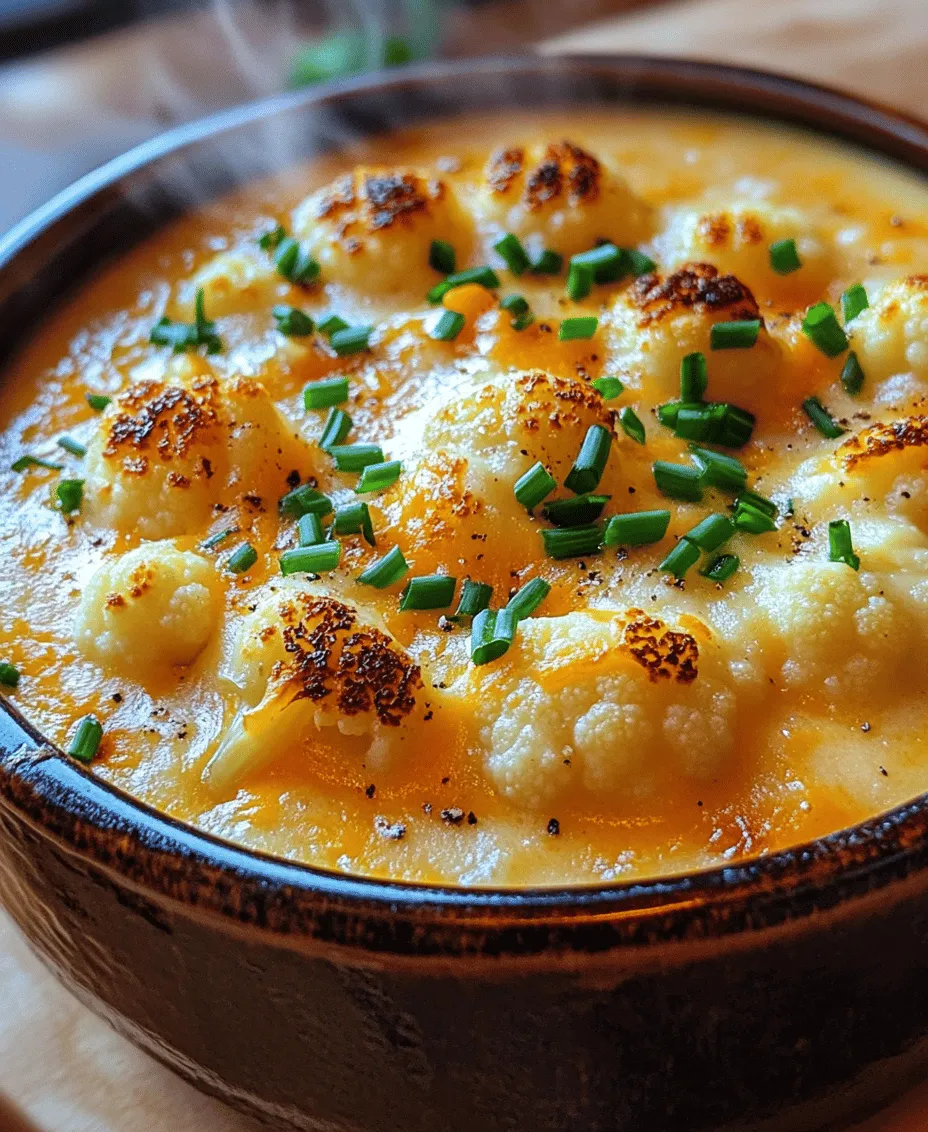Introduction
In the realm of comforting dishes, few can rival the allure of a warm bowl of Roasted Garlic Cheddar Cauliflower Soup. This creamy delight is not just a seasonal favorite; it transcends the boundaries of weather and occasion, making it a cherished recipe in households year-round. The combination of roasted garlic, sharp cheddar cheese, and tender cauliflower creates a rich tapestry of flavors that envelops you with every spoonful.
Cauliflower, often hailed for its versatility, is the star of this dish, offering not only a creamy texture but also a bounty of health benefits. Packed with vitamins, minerals, and fiber, it supports a healthy lifestyle while catering to various dietary needs—whether you’re vegetarian, gluten-free, or simply looking to incorporate more vegetables into your meals. Paired with the aromatic richness of roasted garlic, this soup is a perfect blend of comfort food and nutrition, making it an ideal choice for both casual dinners and special occasions.
The Appeal of Roasted Garlic Cheddar Cauliflower Soup
Comfort food holds a special place in our hearts, often evoking memories of home-cooked meals and family gatherings. Roasted Garlic Cheddar Cauliflower Soup exemplifies this genre, providing warmth and satisfaction in a bowl. It’s not just about nourishing the body; it’s about nurturing the soul. The act of preparing and sharing this soup can bring loved ones together, fostering connection and comfort.
From a nutritional standpoint, cauliflower is a powerhouse vegetable. Low in calories yet packed with fiber, it makes for an excellent base in soups, allowing you to indulge without guilt. Rich in vitamins C and K, as well as folate and potassium, cauliflower contributes positively to your health. Its high fiber content aids digestion and promotes a feeling of fullness, making it an excellent choice for those looking to maintain or lose weight.
Garlic, on the other hand, has been celebrated for centuries not just for its bold flavor but also for its myriad health benefits. Known for its anti-inflammatory and immune-boosting properties, garlic is a staple in many culinary traditions. Roasting garlic enhances its sweetness and mellows its pungency, creating a depth of flavor that elevates the soup beyond the ordinary.
Cheddar cheese adds the final touch to this delectable dish, imparting a sharpness that perfectly balances the creaminess of the cauliflower. The melting characteristics of cheddar ensure a smooth, velvety texture that coats each bite. Whether you opt for a sharp aged cheddar for a more pronounced flavor or a mild variety for a subtler taste, the result is a comforting soup that is sure to please.
Ingredients Breakdown
Creating Roasted Garlic Cheddar Cauliflower Soup involves a handful of carefully selected ingredients, each playing a vital role in the overall flavor and texture of the dish. Let’s explore the main components that make this soup a standout recipe.
Cauliflower
At the heart of this soup is the humble cauliflower. Not only does it serve as the primary ingredient, but it also contributes to the silky consistency that characterizes this dish. Cauliflower is a cruciferous vegetable that boasts a low calorie count—around 25 calories per cup—making it an excellent choice for those watching their caloric intake. Additionally, it is rich in fiber, which is beneficial for digestive health, and packed with essential vitamins and minerals, including vitamin C, vitamin K, and folate. Its ability to take on flavors makes it a perfect base for soups, allowing the other ingredients to shine.
Garlic
Garlic is the flavor powerhouse in Roasted Garlic Cheddar Cauliflower Soup. When roasted, garlic undergoes a transformation, becoming sweet and caramelized, which adds complexity to the soup. The process of roasting garlic involves gently cooking it until it becomes soft and golden, allowing the natural sugars to develop and mellowing the sharpness that raw garlic often possesses. This rich, aromatic addition not only enhances the overall taste but also brings along numerous health benefits, including its antibacterial properties and potential to boost heart health.
Olive Oil
Olive oil is more than just a cooking fat in this recipe; it is a key flavor enhancer. Known for its health benefits, including heart-healthy monounsaturated fats and antioxidants, olive oil is a staple in Mediterranean diets. In this soup, it serves as the medium for sautéing the onions and garlic, helping to release their flavors. Using high-quality extra virgin olive oil can elevate the dish, imparting a fruity note that complements the other ingredients beautifully.
Onion
Onion adds depth and complexity to the soup’s flavor profile. When sautéed, onions become sweet and tender, creating a flavorful base that supports the other ingredients. They also contribute to the overall aroma of the dish, making the cooking process an inviting experience. The natural sugars in onions caramelize during cooking, enriching the soup’s flavor.
Vegetable Broth
For this recipe, vegetable broth is the liquid base that brings everything together. It not only adds moisture but also infuses the soup with additional flavor. Choosing a high-quality vegetable broth ensures that the final dish is well-seasoned and rich. If you prefer a heartier flavor, homemade broth can be an excellent alternative, allowing you to control the ingredients and seasoning.
Cheddar Cheese
Cheddar cheese is what transforms this soup from a simple vegetable puree into a luxurious, creamy dish. With a variety of cheddars available—ranging from mild to sharp—the choice of cheese can significantly impact the final flavor. Sharp cheddar provides a pronounced tanginess that contrasts beautifully with the sweetness of the roasted garlic and cauliflower, while a milder cheese can create a more subtle, creamy taste. It is essential to grate the cheese to ensure it melts smoothly into the soup, resulting in a velvety texture.
Milk
Milk is often used to adjust the consistency of the soup, making it creamier without the need for heavy cream. For a richer taste, whole milk can be used, but for those looking for lighter options, low-fat milk or plant-based alternatives—such as almond milk or oat milk—can be great substitutes. The choice of milk allows for versatility, accommodating different dietary preferences while maintaining a creamy texture.
Thyme
Finally, fresh thyme adds an herbal note that enhances the overall flavor of the soup. Thyme pairs exceptionally well with both garlic and cheese, providing an aromatic backdrop that elevates the dish. If fresh thyme is unavailable, dried thyme can be used in smaller amounts, though the flavor will be less vibrant. Other herbs, such as rosemary or parsley, can also be considered for those looking to experiment with different flavor profiles.
By understanding the role of each ingredient in Roasted Garlic Cheddar Cauliflower Soup, you can appreciate the thoughtful balance of flavors and textures that make this dish so special. In the following sections, we will delve into the detailed instructions for preparing this comforting soup, as well as tips for achieving the best results.

Seasoning: The Importance of Salt and Pepper in Enhancing Flavors
When it comes to creating depth in any dish, seasoning plays a crucial role, particularly in our Roasted Garlic Cheddar Cauliflower Soup. Salt and pepper are not merely afterthoughts; they are essential for elevating the natural flavors of your ingredients. Salt enhances sweetness and balances bitterness, while pepper adds a subtle heat that can brighten the overall dish.
As you prepare your soup, be sure to season at multiple stages of cooking. Start by adding salt and pepper to the onions as they sauté, enhancing their sweetness and richness. Adjust the seasoning as you combine and simmer your ingredients, tasting along the way to ensure a well-rounded flavor profile. The right amount of seasoning can make the difference between a good soup and a great one.
Step-by-Step Instructions
1. Roasting Garlic
Roasting garlic is a transformative process that mellows its sharpness and brings out a rich, nutty sweetness. To start, preheat your oven to 400°F (200°C). Take a whole bulb of garlic, slice off the top, and drizzle it with olive oil, wrapping it in aluminum foil. Place the wrapped bulb on a baking sheet and roast for about 30-35 minutes, or until the cloves are soft and golden brown. Visual cues for doneness include a fragrant aroma filling your kitchen and a slight caramelization on the cloves. Once roasted, let it cool slightly before squeezing the soft garlic cloves out of their skins.
2. Preparing Cauliflower
For the best texture and flavor, choose a fresh head of cauliflower. Remove the leaves and cut it into florets, ensuring they are uniform in size for even cooking. Rinse the florets under cold water to remove any dirt. To enhance the flavor, consider roasting the cauliflower along with the garlic. Toss the florets in olive oil, salt, and pepper before spreading them out on a baking sheet. Roast in the same oven at 400°F (200°C) for about 20-25 minutes, or until the edges are golden brown and tender. This roasting adds a caramelized flavor that will deepen the soup’s overall taste.
3. Sautéing Onions
In a large pot, heat a couple of tablespoons of olive oil over medium heat. Add diced onions and a pinch of salt. The goal is to develop a sweet, translucent base for your soup. Sauté the onions for about 5-7 minutes, stirring frequently to prevent burning. You want them to soften and become fragrant without browning too much. This process caramelizes the natural sugars in the onions, enriching the soup’s overall flavor.
4. Combining and Simmering
Once your onions are ready, add the roasted cauliflower and garlic to the pot. Pour in vegetable or chicken broth to cover the vegetables, typically about 4 cups. Bring the mixture to a boil, then reduce to a simmer. Allow it to cook for about 15-20 minutes until the cauliflower is tender, which will enhance its creamy texture when blended. Stir occasionally and adjust the seasoning with salt and pepper as needed.
5. Blending the Soup
To achieve a smooth and creamy soup, you have two options for blending: an immersion blender or a traditional blender.
– Immersion Blender: This handheld gadget allows you to blend the soup directly in the pot, which is convenient and reduces cleanup. Simply insert the immersion blender into the soup and blend until smooth.
– Traditional Blender: If you prefer a traditional blender, be sure to let the soup cool slightly before transferring it in batches to avoid splattering. Blend on high until you reach a creamy consistency. Remember to leave a small vent in the blender lid to release steam.
Both methods will give you a deliciously smooth texture, so choose whichever fits your kitchen style best.
6. Incorporating Cheese and Milk
After blending, return the soup to the pot and stir in shredded sharp cheddar cheese and a splash of milk or cream. The key to achieving the perfect creamy consistency is to add the cheese gradually, allowing it to melt fully before adding more. This will create a rich, velvety texture that’s irresistible. If you’d like a bit of tang, consider adding a touch of sour cream or a squeeze of lemon juice just before serving.
7. Final Presentation
To serve your Roasted Garlic Cheddar Cauliflower Soup, ladle it into warm bowls. Garnish with a sprinkle of additional cheddar cheese, fresh chives, or a drizzle of olive oil for an appealing presentation. Serve with a slice of crusty bread or a light salad for a balanced meal. The presentation matters, as it sets the stage for the deliciousness to come.
Variations and Adaptations
This recipe is versatile and can be adapted based on dietary needs or flavor preferences.
– Ingredient Substitutions: For a vegan version, replace cheddar cheese with a vegan cheese alternative and use plant-based milk such as almond or oat milk. You can also omit the dairy entirely and add extra nutritional yeast for a cheesy flavor.
– Flavor Variations: Experiment with spices like smoked paprika or cumin to add warmth. You can also mix in other cheeses such as gouda or pepper jack for a different flavor profile. For added nutrition, consider blending in cooked carrots or adding sautéed mushrooms for depth.
– Serving Suggestions: This soup pairs beautifully with crusty artisan bread, a fresh green salad, or as a side dish to grilled meats or roasted vegetables. It’s perfect for a cozy dinner or as a starter for a larger meal.
Storage and Reheating Guidelines
To keep your Roasted Garlic Cheddar Cauliflower Soup fresh, follow these storage tips:
– Refrigeration: Store leftovers in an airtight container in the refrigerator for up to 4 days. Allow the soup to cool completely before sealing it to avoid condensation.
– Freezing: For longer storage, freeze the soup in a freezer-safe container for up to 3 months. Leave some space at the top of the container to allow for expansion as the soup freezes.
Reheating
When it’s time to enjoy the leftovers, reheat gently on the stove over low heat, stirring frequently to prevent sticking. If the soup thickens too much in the fridge or freezer, you can add a splash of broth or milk to achieve your desired consistency.
Repurposing Leftovers
Get creative with any leftover soup! Use it as a creamy base for casseroles, mix it into pasta dishes, or even use it as a sauce for roasted veggies. The possibilities are endless, ensuring that you don’t waste a drop of this delicious creation.
Conclusion
The Roasted Garlic Cheddar Cauliflower Soup is a delightful blend of health and comfort, making it an excellent addition to your meal rotation. This creamy, savory soup not only satisfies your taste buds but also provides a comforting warmth that’s perfect for chilly evenings.
The versatility within this recipe allows you to experiment with flavors, making it easy to adapt to your dietary preferences and creative whims. We hope you feel inspired to try this recipe and make it your own while enjoying the foundational flavors and techniques shared here. Whether you’re savoring it on a quiet night in or impressing guests at a dinner party, this soup is sure to become a favorite in your kitchen.

